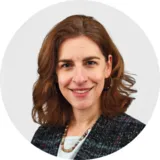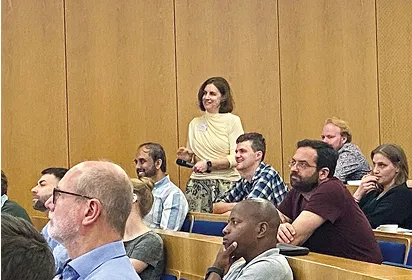Workshops and evaluation tools to increase gender diversity
Gender diversity in the sciences is a persistent problem, with no easy solutions or regular evaluation of program success. This project took a multifaceted approach, evaluating novel education tactics for both postdoctoral researchers and male faculty. Ongoing work focuses on building a tool to measure changes in coauthorship gender ratios before and after intervention implementation.

Focus Group: Removing Institutional Roadblocks for Inclusion in Science
Prof. Andrea M. Erhardt (University of Kentucky), Alumna Anna Boyksen Fellow (funded as part of the Excellence Strategy of the federal and state governments) | Hosts: Prof. Martin Elsner, Prof. Rolf Moeckel (TUM)
(Image: Andrea Erhardt)
Universities across the world have attempted to both recognize and address the lack of gender diversity in the sciences. Challenges with bias, lower collaboration opportunities, and lower-profile speaking engagements persist. During this Fellowship, we took a multi-pronged approach to addressing and evaluating intervention activities.
This report will outline the four deliverables /actions for this project. These include 1) a workshop for TUM postdoctoral researchers focused on techniques for improving diversity and inclusion as they build their future research groups; 2) the development and execution of the Advocates and Allies Program at TUM; 3) a workshop to highlight female scientists and promote networking opportunities; and 4) an ongoing project to develop a tool to quantify the impact of interventions on female academic success.
Postdoctoral diversity workshop

Postdoctoral researchers represent the future of science. Typically, members of this group both have the most regular contact with graduate students and are developing ideas of their own future research group structure. In June 2023, I gave the two-hour workshop entitled “Be Part of the Solution: Identifying Solutions to Advance Underrepresented Groups in Science.”
This workshop focused on understanding the problem (“Why are we here?”), providing action items (“What can we do about it?”), and outlining the path toward executing those objectives (“How do we move forward?”). These modules included interactive sessions and resulted in multiple follow-up conversations with participants. The group in attendance was enthusiastic and engaged. I have offered to repeat the workshop if needed.
Additionally, the outreach I did to gender equity officers and others on campus resulted in collaborations on their future faculty and postdoctoral orientation materials. I reviewed and provided feedback on multiple iterations of unconscious bias training that was in development at TUM and was a resource on diversity materials at TUM.
Advocates and Allies: Teaching men to be better gender advocates
A hallmark of our efforts was the establishment and execution of the Advocates and Allies Program at TUM. This program takes a unique approach, namely focusing on having men educate other men on gender and equity issues. The general framework of this program has been established at ~15 US universities over the last seven years; significant revisions tailored it to the TUM professoriate.
We ran two workshops, the first focused on TUM faculty and the second for TUM-IAS Fellows. The participants were recruited through gender diversity officers, department listservs, and personal messages from Profs. Elsner and Moeckel. During this workshop, the participants engaged in topics that included gendered language, understanding the impacts of sexism, and the importance of inclusive networking. Overall, the feedback was very positive, with participants saying that they came away with a greater appreciation of both the issues and constructive actions. We have been in discussions to implement this program for a larger university audience.
Isotope science workshop
Increasing the professional networking of women includes raising visibility through invited talks. As I continue to learn about both the impacts and drivers of gender inequity in science, one of the consistent themes is the lower visibility and reduced networking activities for female scientists. With this in mind, Martin Elsner and I originated a two-day workshop gathering the top scientists in our field, isotope chemistry, highlighting top female scientists. More than 50 researchers from Europe, North America, and South America attended, with more than 50 % female participation in a highly masculine field. A lovely introduction from the TUM-IAS Managing Director promoted an environment to discuss gender issues throughout the meeting. We balanced both scientific objectives and gender equity objectives, creating an extremely positive environment to highlight female isotope chemists.
This meeting was an originating event for a larger community push, with a follow-on meeting planned for Prague in July 2025. This future meeting will again have a stated intent to showcase female and diverse researchers. The leadership team is composed of female and diverse scientists, including myself, Dr. Amy Hofmann (Cal Tech / NASA) and Dr. Issaku Kohl (University of Utah). My inclusion directly resulted from my role running the TUM-IAS meeting.
Scientifically, these efforts have resulted in new research directions. The collaborations established with Martin Elsner have resulted in two proposal submissions for an instrument platform. Additionally, Martin Elsner arranged for a visit to the ThermoFisher factory in March 2023, allowing Dr. Erhardt to meet the instrument development team and learn about the latest scientific advances. This networking and our collaboration have opened a new research focus for Dr. Erhardt, a direction that would not have been possible without the TUM-IAS support.
Gender diversity publication metric
Moving forward, I will continue ongoing work on building a tool to measure the impacts of the interventions tested in this program along with larger, nationwide interventions. One of the keys to success in academia is building a large collaboration network, as these collaborations can result in joint proposal submissions, inclusion in publications, and enhancement of the scholar’s reputation. Women have been shown to have smaller collaboration networks than men of the same rank and tier institution, likely a result of unconscious bias. This tool will analyse the gender ratio of scholars’ publication networks, examining comparable programs where efforts have been undertaken to increase gender equity.
To accomplish this, a researcher’s publication history and coauthors are taken from the SCOPUS database for each year. Using a commercially available Gender API, the likelihood of each coauthor to be male or female is determined. The researcher can then be assigned a “gender diversity score” based on the gender distribution of coauthors. This determination can then be done in aggregate to look at trends within institutions or disciplines, or after an intervention program.
While this work is ongoing, Anna Boyksen funds were used to support a part-time computer science student. We hope to test the impact of programs such as Athena Swan (UK) and NSF ADVANCE (USA). I hope to show the early results at the 2025 TUM-IAS General Assembly, with publication following thereafter.
Selected publications
- Erhardt, G.D., Dziulba, T.D., Moeckel, R., Elsner, M. & Erhardt, A.M. Engaging men in creating a culture for the success and advancement of women in the transportation workforce. Transportation Research Board Annual Meeting. Poster Presentation (2024).
- Erhardt, A.M. & Erhardt G.D. The impact of male-lead training on changing gender perceptions: Early results from Advocates and Allies training sessions in the USA and Germany. American Geophysical Union. Poster Presentation (2023).
- Erhardt, A.M. & Erhardt G.D. The impact of male-lead training on changing gender perceptions: Early results from Advocates and Allies training sessions in the USA and Germany. Goldschmidt Geochemistry Conference, Poster Presentation (2023).
- Reis*, A.J., Fichtner, V. & Erhardt, A.M. Changing sub-surface chemistry resulting from a 26-million-year unconformity: Porewater chemistry from IODP Site U1553 in the South Pacific. Paleoceanography and Paleoclimatology, 38(7), e2022PA004561 (2023).
* student author
- Chuang, P.-C., Erhardt, A.M. & Abbott, A.N. Geochemistry of pore water. In: Anbar, A., Weis, D. (eds.) Treatise on Geochemistry (Third Edition) 4, Elsevier, 631-682 (2025).